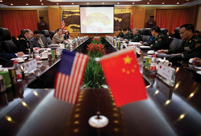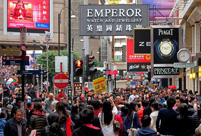 'Jin' named the word of the year by cross-strait netizens
'Jin' named the word of the year by cross-strait netizens Chinese scientific expedition goes to build new Antarctica station
Chinese scientific expedition goes to build new Antarctica station
 Chinese naval escort fleet conducts replenishment in Indian Ocean
Chinese naval escort fleet conducts replenishment in Indian Ocean 17th joint patrol of Mekong River to start
17th joint patrol of Mekong River to start China's moon rover, lander photograph each other
China's moon rover, lander photograph each other Teaming up against polluters
Teaming up against polluters
On the one hand these phenomena are the results of some local governments’ partial understanding of the urbanization process, and often result from a single-minded pursuit of GDP and a disengagement from any associated concerns. On the other hand it is important to recognize that they stem from a lack of clarity, consistency, and maturity in the mechanisms for financing the process of urbanization. Although urbanization could liberate enormous domestic demand and directly boost industrial upgrading, the consequent rise in the demands on social security must be met and assured, otherwise the process will not work.
According to the conclusions of the Conference, we need to identify new ways to promote urbanization, establishing a new mechanism to guarantee funding which is sustainable and pluralistic, and we can only provide a complete solution to the problem of financing by accurately understanding these conclusions. To establish a sustainable and pluralistic mechanism will mean addressing the following points: first, ensuring the focus and sources of governmental investments; second, establishing a system of diverse channels of financing; third, clarifying the sharing mechanism for social security funds.
Both central and local governments must make scientific development plans, and they must direct their attention to infrastructure. Governments are the main investors in infrastructure; to improve local financing mechanisms they should gradually establish a local taxation structure that is appropriate to their own needs, says Dai Xianglong, secretary of SSF. We can only promote healthy urbanization and avoid the problems associated with urbanization of land and selling national land at low prices by clarifying that which should belong to governmental investment, and through the security of the investment mechanism.
In terms of diverse financing, the focal point is relaxing market access, encouraging private capital to engage in the creation of urban infrastructure. Nowadays, apart from some areas that should be supported by governments, private capital should play a more significant role. If we can create a good market environment managed according to the rules of the market, urbanization can prosper.
The main costs facing rural residents who move to the cities are social security, education, health-care, and providing for their old age. Today, every city has established some level of social security system, but the fact that they are working separately and raising money independently has caused financial overload. Moreover, these new residents may have paid insurance in other places, and even if these payments can be transferred with them to their new location, there may still be many differences in timing and sums. In addition, there is also the problem of the segmentation in the outlet of education from government finance, adding further pressure on these new residents. To solve these problems, we need to set up a unified network of social security, creating rational mechanisms of sharing among governments, enterprises and individuals. At the same time we have to form a new mechanism connecting the people who are transferring from rural areas to cities with transfer payments from the exchequer, encouraging advanced areas to absorb more rural residents and converting them into local citizens, thus helping the urbanization process to run more smoothly.

 Commemorate 120th birth anniversary of Mao Zedong
Commemorate 120th birth anniversary of Mao Zedong Female soldiers of PLA Marine Corps in training
Female soldiers of PLA Marine Corps in training Chinese cities to have a very grey Christmas as smog persists
Chinese cities to have a very grey Christmas as smog persists China and U.S. - the national image in each other’s eyes
China and U.S. - the national image in each other’s eyes The Liaoning's combat capability tested in sea trial
The Liaoning's combat capability tested in sea trial Chinese pole dancing team show their moves in snow
Chinese pole dancing team show their moves in snow Rime scenery in Mount Huangshan
Rime scenery in Mount Huangshan Ronnie O'Sullivan: My children mean the world to me
Ronnie O'Sullivan: My children mean the world to me Shopping in Hong Kong: a different picture
Shopping in Hong Kong: a different picture SWAT conducts anti-terror raid drill
SWAT conducts anti-terror raid drill AK-47 inventor dies at 94
AK-47 inventor dies at 94 Mother practices Taiji with her son
Mother practices Taiji with her son  Crashed French helicopter salvaged
Crashed French helicopter salvaged Winter travels in Anhui
Winter travels in Anhui  Bird show opens to public in Calcutta, India
Bird show opens to public in Calcutta, IndiaDay|Week|Month